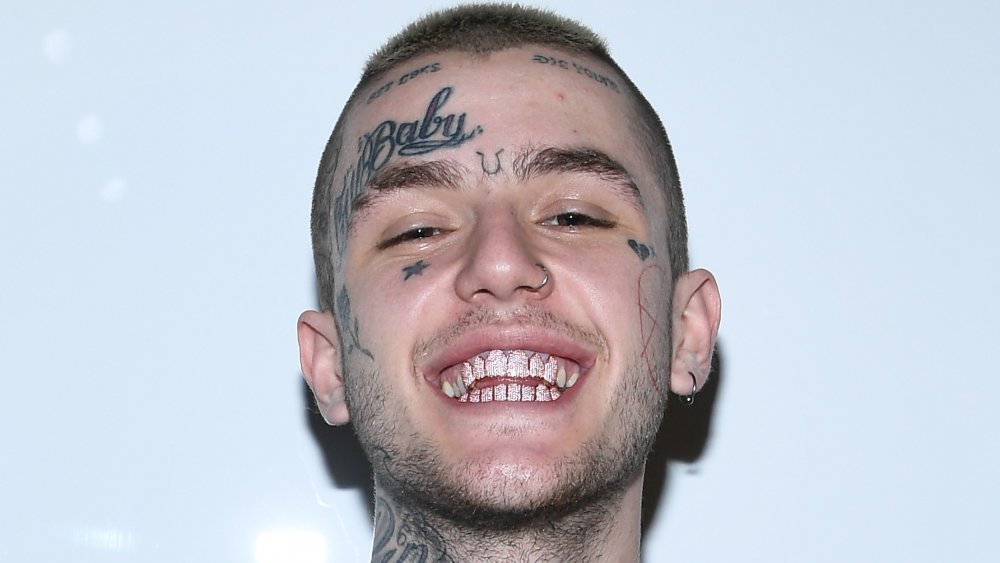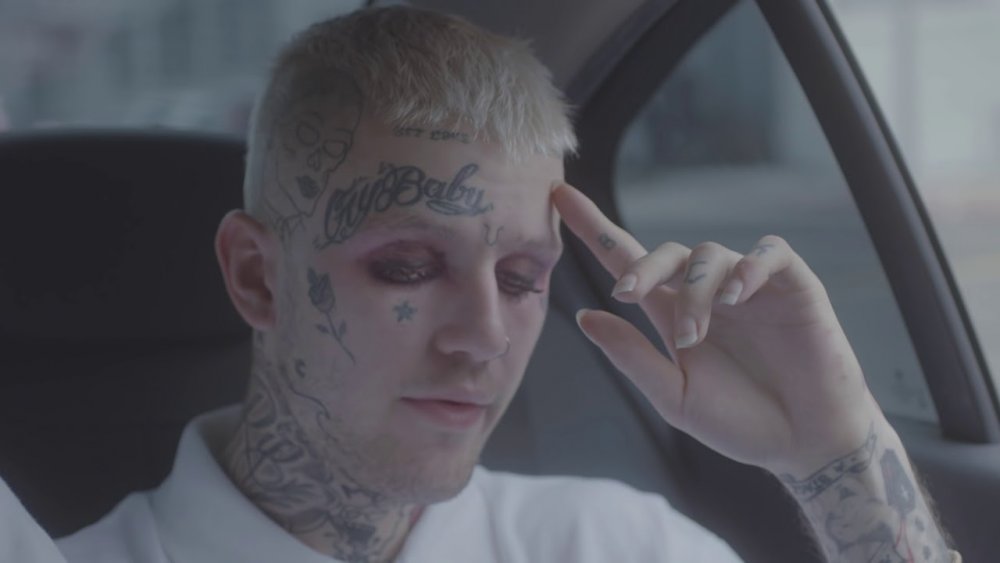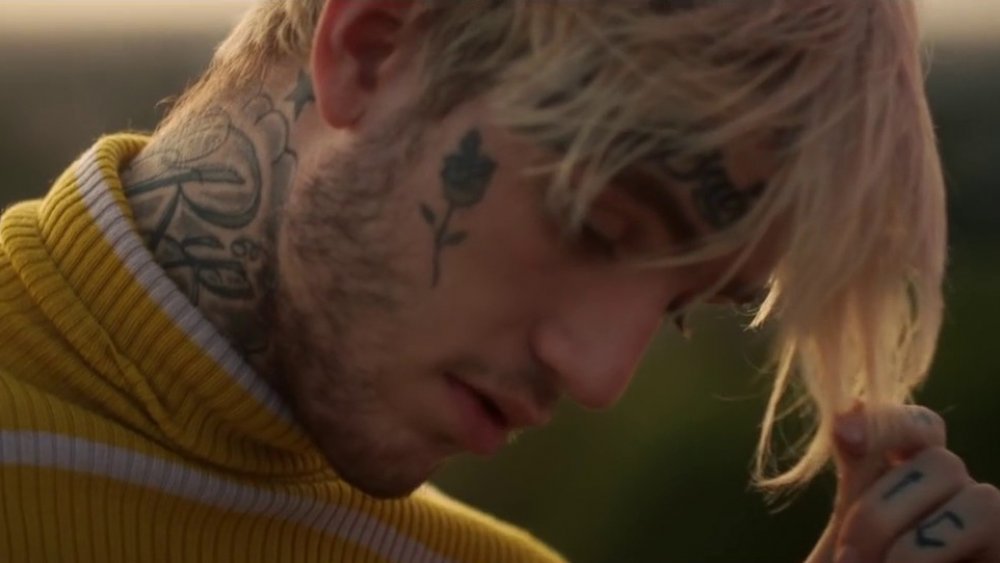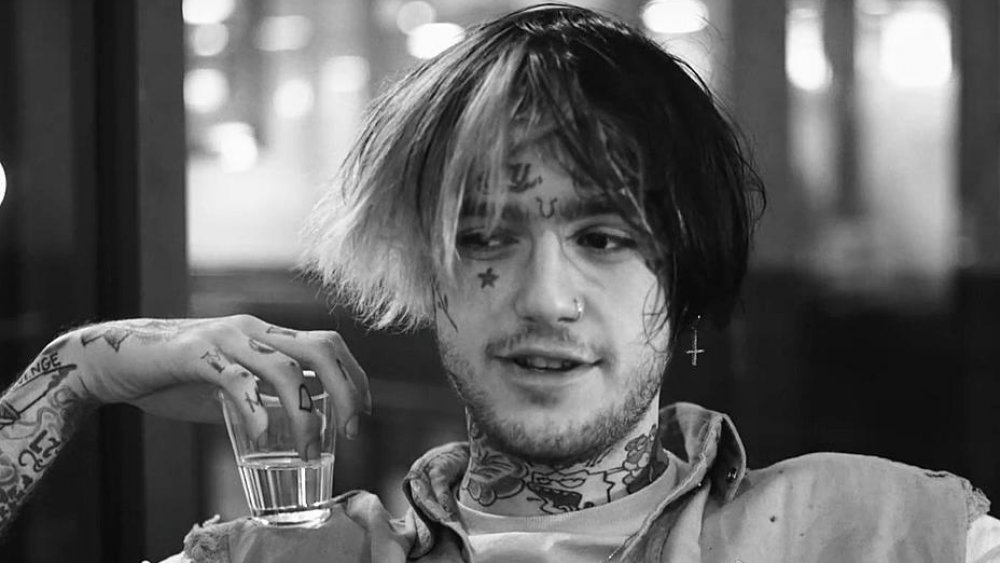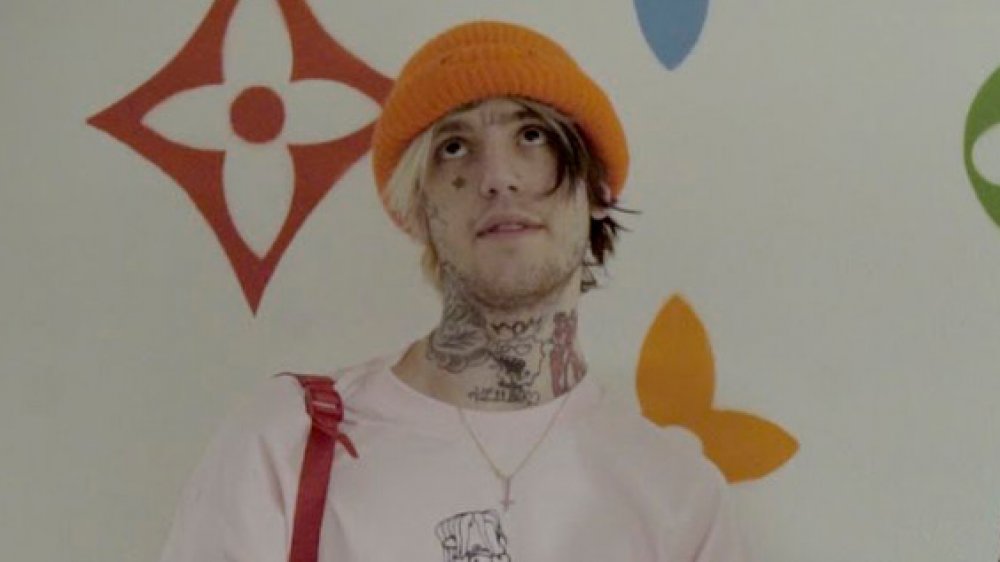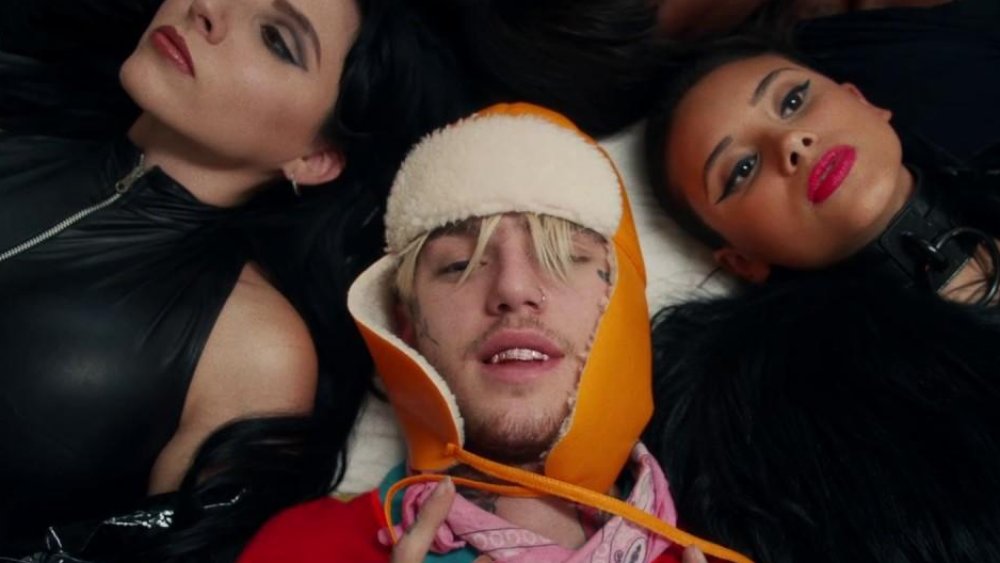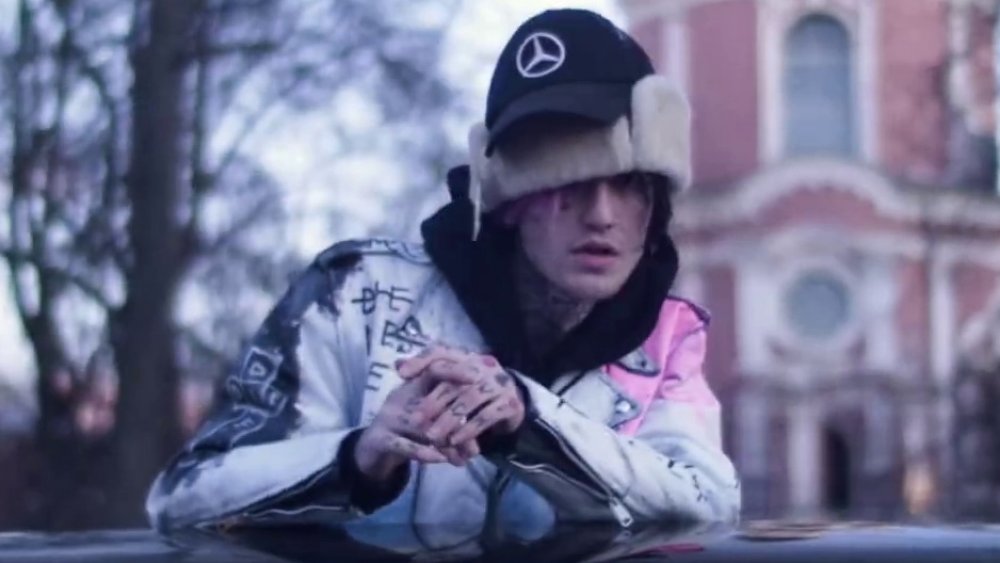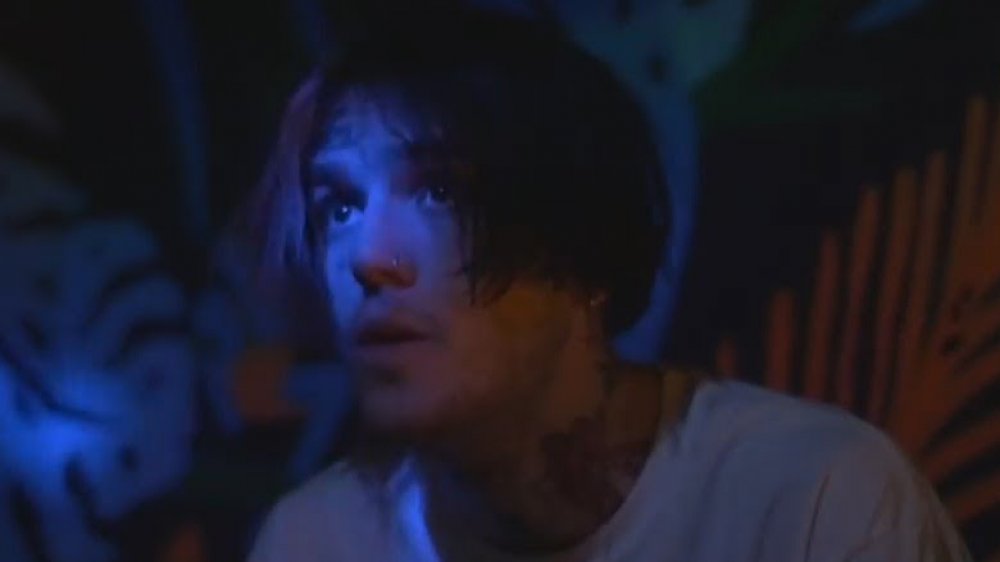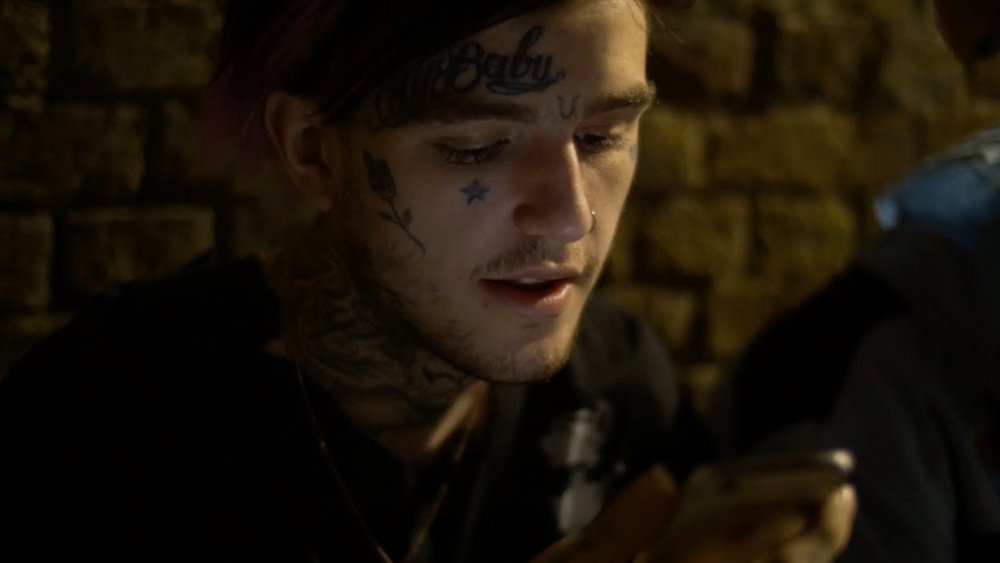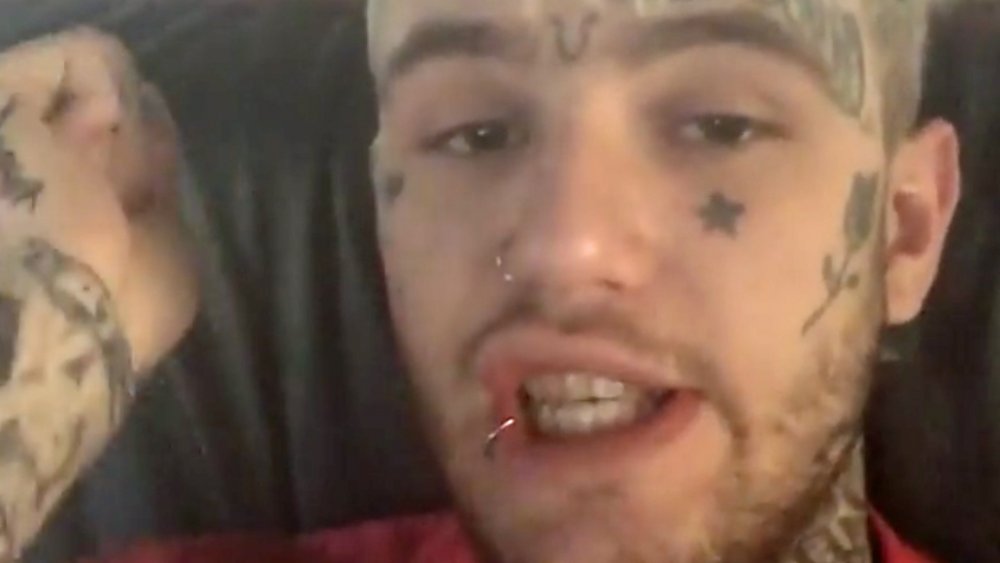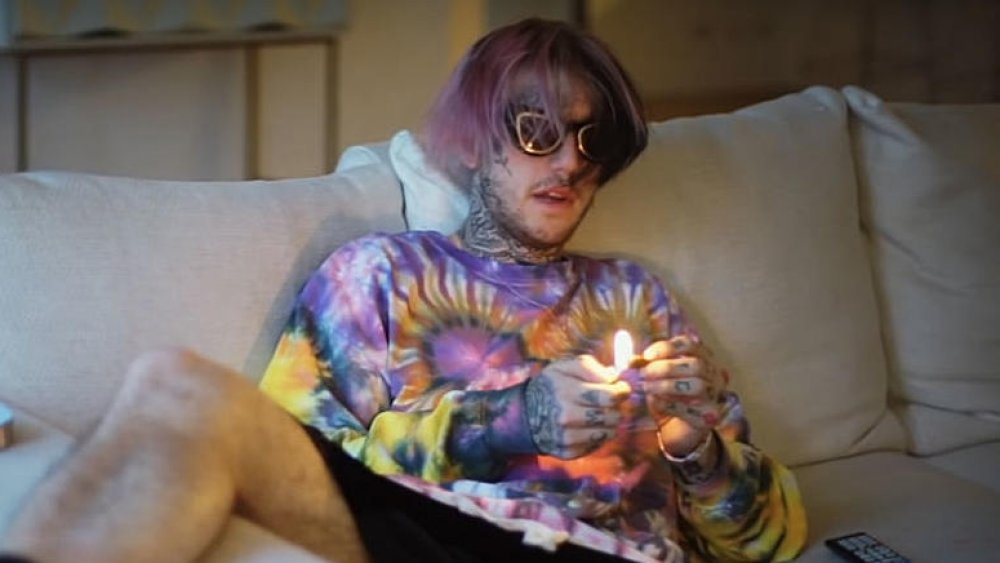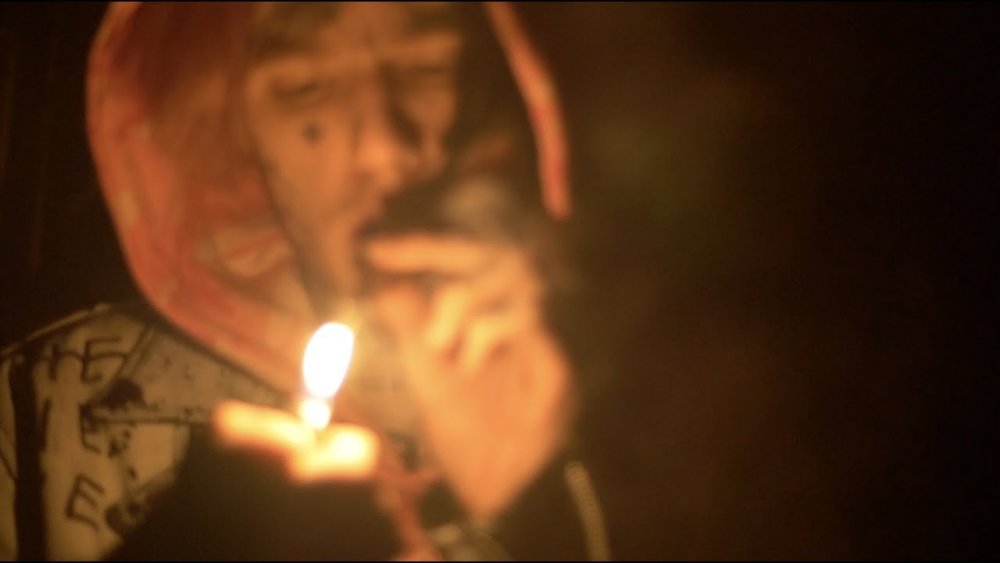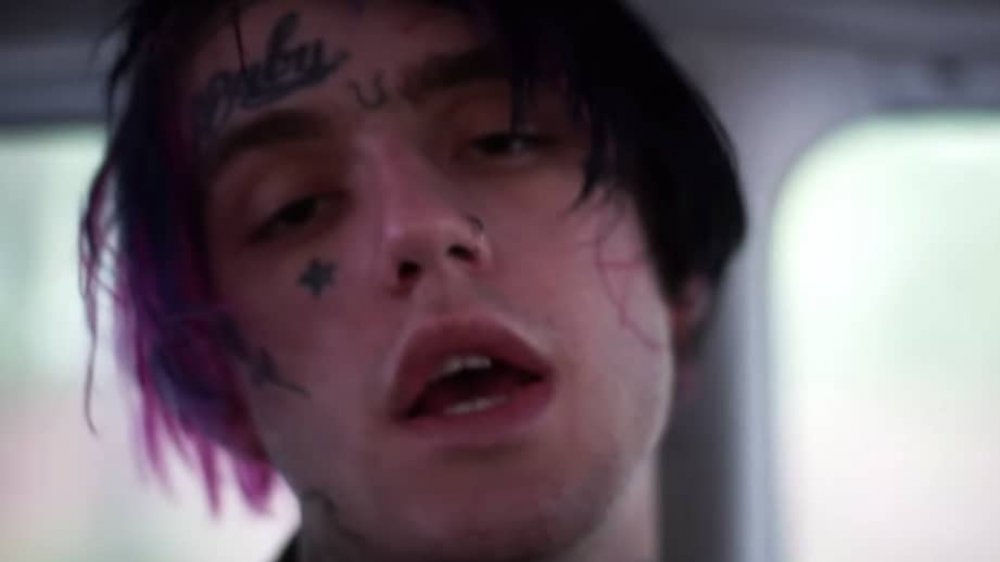The Tragic Real-Life Story Of Lil Peep
Born Gustav Åhr, the rapper known as Lil Peep made a lot of noise in the music scene in a short period of time. After releasing his first mixtape in 2015, the artist gained a large following from within the SoundCloud rap community. His legend grew as he eluded genre and blended rock and rap in creative ways. And by the time he released his debut album, Come Over When You're Sober Pt. 1, in August 2017, Lil Peep's influence was reaching far and wide.
As a member of the musical collective, GothBoiClique, the oft called emo-rapper began his album tour in Germany late the following month. But sadly, he never reached his final tour destination. Set to perform in Tucson, Ariz. on the evening of Nov. 15, 2017, Lil Peep died of an accidental overdose of Xanax and fentanyl at the age of 21.
Though many people have come to know Peep's music since the rapper's untimely death, his life and history have remained a little more mysterious. We decided to pull the curtain back a little, exploring what made this young musician who he was, beyond just the eye-catching tattoos, dark lyrics, and substance abuse that seemed to define him. This is the tragic real-life story of Lil Peep.
Lil Peep's rejection of the box
As a teenager in Long Beach, N.Y., Lil Peep noticed a rift between the wealthy and the poor in his community. At the Lil Peep memorial held in December 2017, his mother, Liza Womack, spoke of how this division began to shape her son: "Gus got fed up with that world. He rejected it, and he rejected being molded into a box ... When he locked himself in the garage and got his first tattoo, he began to make his rejection of the box public."
It's unclear how much of this was self-imposed isolation or Lil Peep being ostracized from others his age, but his mother saw a turn in the rapper during his senior year of high school. "People who'd been his friend stopped being his friend," Womack later told Pitchfork. "He was low, and he felt like s**t. He had black curtains in his room, he was in bed most of the time, and it was messy, ashes everywhere."
Lil Peep would later reflect on his feelings about Long Beach in the song, "Cry Alone," with lyrics like: "I hate everybody in my hometown / I wanna burn my old high school into the ground." Even after the rapper said so long and set off to sunny California to pursue music full time, it didn't fix what he was feeling. "I think there was sadness too when he went to California," Womack told Pitchfork. "He was alone and scared to death."
The rapper's struggle with mental health
Dubbed "the quintessential angsty millennial" by XXL, Lil Peep suffered from more than simple angst. The rapper's battle with anxiety and depression was well documented, both by himself and those around him.
According to Rolling Stone, he "developed intense anxiety around age 16, sometimes vomiting in the morning at the thought of going to school." Meanwhile, the theme of depression would spill out in Lil Peep's lyrics — one of the main reasons he was able to connect with his fans. He often spoke about pain and suicidal thoughts in songs like "OMFG," with lyrics like, "I used to wanna kill myself / Came up, still wanna kill myself / My life is goin' nowhere / I want everyone to know that I don't care."
Lil Peep spoke about his mental health in an interview with Pitchfork, saying, "Yeah, it is serious. I suffer from depression and some days I wake up and I'm like, F**k, I wish I didn't wake up." He added, "Some days I'll be very down and out, but you won't be able to tell, really, because I don't express that side of myself on social media. That's the side of myself that I express through music. That's my channel for letting all that s**t out."
If you or someone you know is having suicidal thoughts, please call the National Suicide Prevention Lifeline at 1-800-273-TALK (8255) or text HOME to the Crisis Text Line at 741741.
The effect of Lil Peep's tattoos
While Lil Peep's tattoos likely garnered him plenty of sideways glances from outsiders, it was that judgement that largely inspired him to take his body art so far, particularly when it came to his face tattoos. In an interview with GQ, he explained why he got his first face tattoo — a broken heart under his left eye — in 2015.
"I'm very just like outgoing with it," Lil Peep said. "It was kind of like a push for myself to like be successful with the music I was doing, because it can make it harder to get a job when your face is covered in tattoos." The music artist knew that not everyone would like his tattoos and their somewhat chaotic arrangement, and he admittedly reveled in that.
But as his mother said at his memorial, "The more tattoos and piercings he got, the more he was treated like an outsider, and the more of an outsider he became. Being an outsider, a reject, hurt him." This too, it would seem, was by design. According to The Guardian, "He'd always felt like an outsider and he wanted to understand what it was to feel like a minority." The tattoos not only gave him that, but also allowed Lil Peep a measuring stick to "spot the difference between the people who saw the tattoos and the people who saw him."
Lil Peep was a child of divorce
While Lil Peep was usually an open book during his interviews, the topic of his father was one that he avoided regularly. His parents divorced when he was 14 years old, and it is believed that it deeply impacted him. In the 2019 documentary, Everybody's Everything, the musician's mother revealed that it was her son who first told her that her husband was being unfaithful (via Pitchfork). Yet, when Lil Peep was asked about his father, he would often change the topic.
According to Rolling Stone, "Peep rarely talked about his father, a history professor, beyond making it clear he had no real relationship with him after the divorce." During an interview with Pitchfork, Lil Peep was asked about his father leaving the family, which made "his eyes dart to the ground." In response, the rapper simply mentioned that he hadn't "spoken to him since." He added, "I don't really f**k with my dad."
The public got perhaps the only unprompted comments from Peep about his dad in a short video in which he ad-libbed lyrics to My Chemical Romance's "Welcome to the Black Parade." In the clip, he sang from his father's perspective, "He said, 'Son when you grow up, I'll leave you, and then you'll make a lot of money in like two years.'"
The ever-host
As Lil Peep was coming up and striving to make a living in music, he moved between different cities and accommodations. In Everybody's Everything, the musician's compassion was put on full display as the documentary details how he brought his friends with him. According to GQ, the formerly homeless celeb intended to split rent with his pals when they moved into a squat in Skid Row, but would regularly pay their portions of the rent.
After he signed his first deal with First Access Entertainment, Peep moved to his own place in Echo Park in Los Angeles, but his friends came with him. According to Rolling Stone, "The place became a virtual refugee camp for struggling SoundCloud artists." The parties were frequent and the drugs were copious. "He felt guilty about being the one to rise to the top really quick," his friend and collaborator, Wicca Phase Springs Eternal, said, "and as a result was overly welcoming."
However, First Access wanted Peep in a more stable setting, so they moved him to London. "It was a very different environment," CEO Sarah Stennett told Rolling Stone. "There was no chaos. I always made sure we had food for him in the fridge ... There were no people just dropping in." Unfortunately, it wasn't long before Peep began struggling with being separated from his friends.
Lil Peep felt under pressure
Many artists face the intense pressures of fame while rising to the top, but it's hard not to think that Lil Peep may have shouldered more than his fair share. While feeling he had to support his friends, he was also caught in a tug-of-war between his past and future: the GothBoiClique collective and his independence.
According to Rolling Stone, First Access Entertainment believed that Lil Peep knew he needed to leave the group early on, with CEO Sarah Stennett claiming that when he signed his contract, he "was effectively accepting that he was not part of GothBoiClique, that he was on his own. He knew he couldn't bring everyone with him." However, GBC member Mackned felt the label was the problem: "Peep was going to leave First Access. He told us that many times."
In the end, it appears the label won out. Before Peep began his solo album release tour, he invited members of GBC to join him for the North American portion. The documentary Everybody's Everything suggests that the invite was meant to be a final send off for the group. According to Stereogum, "He planned to leave his GothBoiClique entourage behind, for reasons related to both his career and his health."
Just a day before his untimely death, Lil Peep spoke to the pressure he felt in trying to satisfy everyone on Instagram, writing in part, "I just [wanna] be everybody's everything."
Gus Åhr vs. Lil Peep
It's unclear how different Gus Åhr and his rapper counterpart, Lil Peep, really were — if it at all. While the rapper said that his music spoke the truth, he also admitted that Lil Peep was a character to a certain extent. "It's like professional wrestling — everyone has to be a character," he explained to Pitchfork. "If you're not a fun enough character, then no one's gonna f**k with you because you don't have enough s**t that's different."
Sebastian Jones, co-director of the Everybody's Everything documentary, has his own theory on Gus Åhr vs. Lil Peep. "I think he was very aware of the Peep thing being separate — it was an alter ego," Jones told the Los Angeles Times. "But the longer you stay in that, the lines get blurred. Does Gus control Peep, or does Peep control Gus?"
In that sense, Oskar Åhr once suggested that playing the part of Lil Peep was what killed his famous brother. "He gets paid to be sad. It's what he made his name on," he said in an interview with People. "I wish it would have paid for him to be a little safer, but the world needed him to have superlative problems that he dealt with in superlative ways. Gus dealt with these problems much better than Lil Peep did, but people didn't know Gus, and there's a reason Gus doesn't sell."
Lil Peep's eerie predictions
The morbid topic of dying young has been approached by many generations of musicians. Kurt Cobain, the lead singer of Nirvana and member of the fateful 27 Club, for example, wanted to name the band's third album, I Hate Myself and I Want to Die. Since his own eerily predicted death, his aesthetic and legacy has become larger than life, particularly among the SoundCloud rap community — not unlike Lil Peep, who's since become a symbol for his generation. In Juice Wrld's song "Legends," a tribute to Peep and XXXTentacion, he asks, "What's the 27 club? We ain't making it past 21." Tragically, Juice Wrld also died at 21 in 2019.
Peep's lyrics now sound similarly prophetic, with songs like "Life is Beautiful" and "Let Me Bleed" speaking to the inevitability of death. In an Instagram post shared the day before he died, Peep wrote, "Maybe I won't die young and I'll be happy? What is happy I always have happiness for like 10 seconds and then it's gone. I'm getting so tired of this." When asked by Montreality what his life might look like as an 86-year-old. Peep said with a laugh, "I'm dead as f**k. I called it. I'm long gone." He added, "S**t might change, but right now I'm out here making music, you know. The s**t I talk about is real, so ... not much to lose right now."
Sadly, this prediction, like too many before him, came true.
A cautionary tale
The topic of drugs was never far from Lil Peep's public or private life. While his often lyrics spoke to heavy drug use, his Instagram account was known to document it. When asked about his drug use on the No Jumper podcast, the musician said, "I'm pretty bad with them ... It's just like the stuff that people offer me. I just kind of go with it. It's whatever we're doing tonight."
However, Lil Peep's family isn't convinced that drugs were really such a big part of his life. "At home, he didn't do drugs like this," his mother told Rolling Stone. "He knew not to do crazy stuff." Peep's brother, Oskar, shared a similar belief in an interview with People: "My brother didn't take five Xanax pills every day. But he would take them and then post on Instagram about it."
The day before his death, that's just what Lil Peep did. In a since-deleted Instagram post, the rapper told fans that he "took six Xanax." He also posted another video of himself dropping what appeared to be more Xanax pills in his mouth. According to TMZ, an accidental combination of Xanax and Fentanyl ultimately led to his death.
Lil Peep's last visit
Just hours before his untimely death in November 2017, Lil Peep met with some fans named Nick Dowd and Mariah Bons on his tour bus. During an interview with Rolling Stone, Dowd said that the duo brought weed, THC wax, and Xanax with them, but according to both fans, neither saw Peep take any pills in the 45 minutes they were with him. However, the rapper, who was said to be "in a very good mood" that day, reportedly appeared to be under the influence of something else and at one point nearly fell asleep standing up.
"This is where things got weird," Dowd said, adding, "His eyes shut and his head went forward. Then me or Mariah was just like, 'Gus!' and he snapped out of it." In an Instagram DM obtained by the media outlet, Bons claimed that Peep explained why he was drowsy, citing the opiate Roxicodone by saying, "Sorry guys, I took 60 milligrams of roxi earlier." Not long after that, Peep apparently nodded off to sleep. According to the two fans, they made mention of Peep's state to their friends via text messages, as well as some of the rapper's tour mates, before leaving the bus at around 5 p.m.
Nearly four hours later, emergency dispatchers were called.
The wake-up call
One of the big questions surrounding Lil Peep's death was why it took so long for the people around him to recognize that he had accidentally overdosed and needed help. According to Rolling Stone, no one immediately raised an alarm because they thought Peep was simply sleeping.
"He was snoring," Peep's tour manager, Belinda Mercer, told detectives. "I tried to wake him up and he sort of reacted. His body wasn't stiff or loose. He kind of moved around a bit but didn't really wake up." When his European tour manager, Steve Paul, checked on Peep before 7 p.m., he also thought the rapper was sleeping. Meanwhile, friend and collaborator Bexey Swan even posted a video showing Peep sleeping and didn't see it as abnormal.
It wasn't until it was time to wake Lil Peep up for his show that night that they all finally realized something was wrong. Though many people believed they heard Peep snoring, what they may have been hearing, tragically, was him dying. "That's the story we hear in almost all opioid overdose deaths," forensic pathologist Jonathan Eisenstat told Rolling Stone. "Their respiratory function is decreasing. People lose their ability to protect their airways, so they start snoring."
Lil Peep's wrongful death lawsuit
In the aftermath of Lil Peep's death, mom Liza Womack filed a lawsuit against First Access Entertainment for negligence and breach of contract. According to the 2019 wrongful death case, Womack has accused FAE for having "allowed, normalized, and even encouraged and promoted" Peep's drug use. The suit claimed that the rapper's team never stopped his 2017 tour, despite Peep reportedly informing management that he was "anxious, stressed, overwhelmed, burnt out, exhausted and physically unwell." Instead, the defendants allegedly "ignored these cries for help and ... pushed decedent onto stage after stage in city after city, plying and propping decedent up with illegal drugs and unprescribed controlled substances all along the way."
Though FAE denied these accusations as "categorically untrue" in comments made to The Blast, text messages obtained by Rolling Stone appeared to suggest otherwise. In August 2017, FAE CEO Sarah Stennett allegedly texted Peep, "I'm about to land at JFK. I have one 2m x and 4 x .25. Are u close to airport." These appear to reference 2-milligram and .25-milligram Xanax pills. That October, Peep allegedly texted tour manager Belinda Mercer, "Ket" — likely a reference to Ketamine. She then reportedly responded, "Don't have any left. It's coming in the morning."
While unresolved as of this writing, Pitchfork suggested that the lawsuit could have a resounding impact on the industry. "Regardless of the outcome in court," one entertainment lawyer speculated, "a case like this could ostensibly launch an activist movement."

